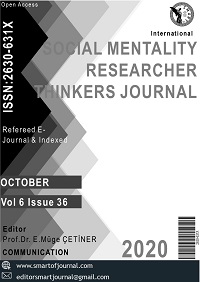Author :
Abstract
Bu çalışmada Kasım 2019 itibariyle etkisinin yaygın şekilde görülmeye başlandığı ve halen devam ettiği COVID-19 diğer adıyla koronavirüs salgının eğitim sektörü üzerindeki etkisi ele alınmıştır. Bu amaç doğrultusunda yerli ve yabancı alanyazın taranmış elde edilen bulgular çalışmaya yansıtılmıştır. Salgının yayılımının önlenmesi amacıyla mesafe faktörü önplana çıkmış; her sahada olduğu gibi eğitimde de bu anlayış kendini göstermiştir. Uzaktan eğitim ise optimum tercih olmuştur. Ancak teknolojiyle paralel ilerleyen bu çözüm her ülke, her il ve her okulda aynı şekilde seyretmemektedir. Bu husus çalışmanın ele aldığı bir diğer konudur. Yapılan literatür derlemesi nihayetinde yalnızca mevcut olanakların uzaktan eğitimin başarısını etkilemediğini aynı zamanda “insan” faktörünün de bu süreçte gözardı edilmemesi de bir diğer kör noktadır. Hele ki bu muhatap bir çocuk olduğunda durum daha da hassas hale gelmektedir. Öte yandan tüm dünyanın da kabullendiği üzere esas sorun temelde krize karşı eğitim sektörünün hazırlıksızlığıdır. Her ülke ve okulda farklı şekillerde gelişse de temel kanı eğitim sektöründe olası krizlere karşı bir B planın olmamasıdır. Bu sorunsal doğrultusunda yeni plan ve politikaların bu şekilde revize edilmesi hem mevcut düzeni hem de gelecek nesilleri korumayı ve başarılarında verimliliği sağlama da bir kilit noktadır.
Keywords
Abstract
In this study, the impact of the coronavirus epidemic, also known as COVID-19, which has started to be seen widely and still continues as of November 2019, on the education sector was discussed. For this purpose, the findings obtained from the domestic and foreign literature were scanned and reflected in the study. In order to prevent the spread of the epidemic, the distance factor came to the fore; This understanding has manifested itself in education as in every field. Distance education has been the optimum choice. However, this solution, which progresses in parallel with technology, does not proceed the same in every country, province and school. This issue is another issue addressed by the study. In the end of the literature review, another blind spot is that not only the available possibilities affect the success of distance education, but also that the "human" factor is not ignored in this process. Especially when this interlocutor is a child, the situation becomes even more sensitive. On the other hand, as the whole world accepts, the main problem is basically the education sector's unpreparedness against the crisis. Although it develops differently in each country and school, the basic opinion is that there is no B plan against possible crises in the education sector. In line with this problematic, revising new plans and policies in this way is a key point to protect both the current order and future generations and to ensure efficiency in their success.





